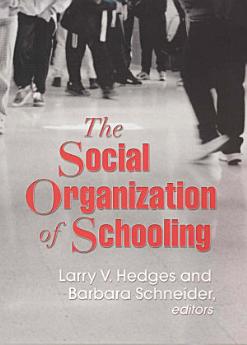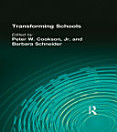The Social Organization of Schooling
Larry V. Hedges · Barbara Schneider
May 2005 · Russell Sage Foundation
E-book
384
Mga Page
reportHindi na-verify ang mga rating at review Matuto Pa
Tungkol sa ebook na ito
Schools are complex social settings where students, teachers, administrators, and parents interact to shape a child's educational experience. Any effort to improve educational outcomes for America's children requires a dynamic understanding of the environments in which children learn. In The Social Organization of Schooling, editors Larry Hedges and Barbara Schneider assemble researchers from the fields of education, organizational theory, and sociology to provide a new framework for understanding and analyzing America's schools and the many challenges they face. The Social Organization of Schooling closely examines the varied components that make up a school's social environment. Contributors Adam Gamoran, Ramona Gunter, and Tona Williams focus on the social organization of teaching. Using intensive case studies, they show how positive professional relations among teachers contribute to greater collaboration, the dissemination of effective teaching practices, and ultimately, a better learning environment for children. Children learn more from better teachers, but those best equipped to teach often opt for professions with higher social stature, such as law or medicine. In his chapter, Robert Dreeben calls for the establishment of universal principles and practices to define good teaching, arguing that such standards are necessary to legitimize teaching as a high status profession. The Social Organization of Schooling also looks at how social norms in schools are shaped and reinforced by interactions among teachers and students. Sociologist Maureen Hallinan shows that students who are challenged intellectually and accepted socially are more likely to embrace school norms and accept responsibility for their own actions. Using classroom observations, surveys, and school records, Daniel McFarland finds that group-based classroom activities are effective tools in promoting both social and scholastic development in adolescents. The Social Organization of Schooling also addresses educational reforms and the way they affect a school's social structures. Examining how testing policies affect children's opportunities to learn, Chandra Muller and Kathryn Schiller find that policies which increased school accountability boosted student enrollment in math courses, reflecting a shift in the school culture towards higher standards. Employing a variety of analytical methods, The Social Organization of Schooling provides a sound understanding of the social mechanisms at work in our educational system. This important volume brings a fresh perspective to the many ongoing debates in education policy and is essential reading for anyone concerned with the future of America's children.
Tungkol sa may-akda
LARRY V. HEDGES is Stella M. Rowley Professor of Education, Psychology, and Sociology in the Harris School at the University of Chicago. BARBARA SCHNEIDERis professor of sociology and human development and codirector of the Alfred P. Sloan Center on Parents, Children, and Work at the University of Chicago.
I-rate ang e-book na ito
Ipalaam sa amin ang iyong opinyon.
Impormasyon sa pagbabasa
Mga smartphone at tablet
I-install ang Google Play Books app para sa Android at iPad/iPhone. Awtomatiko itong nagsi-sync sa account mo at nagbibigay-daan sa iyong magbasa online o offline nasaan ka man.
Mga laptop at computer
Maaari kang makinig sa mga audiobook na binili sa Google Play gamit ang web browser ng iyong computer.
Mga eReader at iba pang mga device
Para magbasa tungkol sa mga e-ink device gaya ng mga Kobo eReader, kakailanganin mong mag-download ng file at ilipat ito sa iyong device. Sundin ang mga detalyadong tagubilin sa Help Center para mailipat ang mga file sa mga sinusuportahang eReader.







